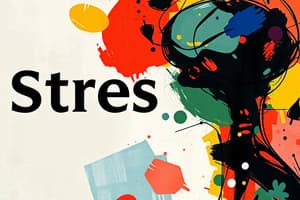Podcast
Questions and Answers
How is stress generally defined in psychological terms?
How is stress generally defined in psychological terms?
- Only as a negative emotional experience.
- As a simple feeling of tension.
- As an external event that causes emotional pain.
- As a transaction between people and their environment. (correct)
Which of the following best describes Eustress?
Which of the following best describes Eustress?
- Stress that is either harmful or beneficial. (correct)
- A psychological condition involving severe anxiety.
- Only harmful pressure from external sources.
- A negative emotional experience.
What characterizes a stressor?
What characterizes a stressor?
- It can only be external situations creating problems.
- It has a uniform impact on everyone.
- It is always controllable by the individual.
- It evokes both approach and avoidance tendencies. (correct)
According to stress models, what should be noted about the reactions to stress?
According to stress models, what should be noted about the reactions to stress?
Which of the following factors was related to stress by Humphrey?
Which of the following factors was related to stress by Humphrey?
What limitation is highlighted in the definition of stress?
What limitation is highlighted in the definition of stress?
Which statement about stress is accurate?
Which statement about stress is accurate?
What is the primary focus of the Stimulus Model of Stress?
What is the primary focus of the Stimulus Model of Stress?
What is the first stage in Seyle's model of stress response?
What is the first stage in Seyle's model of stress response?
According to transactional models, stress arises when:
According to transactional models, stress arises when:
What physiological effect occurs during the Alarm reaction?
What physiological effect occurs during the Alarm reaction?
What characterizes the Resistance stage in Seyle's model?
What characterizes the Resistance stage in Seyle's model?
Which of the following best describes Primary appraisal?
Which of the following best describes Primary appraisal?
What is a potential outcome of prolonged stress according to Seyle's model?
What is a potential outcome of prolonged stress according to Seyle's model?
In the context of stress, what does the term 'challenge' refer to during Secondary appraisal?
In the context of stress, what does the term 'challenge' refer to during Secondary appraisal?
What is a consequence of viewing an event as a threat during appraisal?
What is a consequence of viewing an event as a threat during appraisal?
Flashcards are hidden until you start studying
Study Notes
Overview of Stress
- Stress is commonly understood as pressure, tension, and unpleasant external emotional factors.
- Sources of stress include financial difficulties and emotional strain, which can lead to tension.
- Psychologists define stress as a biochemical, psychological, behavioral, and physiological change.
- Stress can be harmful (distress) or beneficial (eustress).
- It involves negative emotional experiences alongside biochemical, physiological, cognitive, and behavioral changes aimed at either altering or accommodating stressors.
- Stress is seen as a transactional process between individuals and their environments, affecting how one adapts to surroundings.
- Stressors are events or situations in the environment that cause stress, influencing individuals differently based on their perceptions.
Characteristics of Stressors
- Stressful events often lead to overload, preventing adaptation.
- They evoke conflicting tendencies, prompting both approach and avoidance behaviors.
- Some stressors are uncontrollable, exceeding individual limits of control.
- Interpretation of stressors varies; for instance, some may find divorce distressing while others may view it positively.
- Stressors can be external (situational) or internal (emotional or cognitive).
Models of Stress
Stimulus Models
- Developed from engineering concepts regarding environmental disturbance.
- Suggests a certain level of stress is necessary to maintain adaptation and alertness.
- Excessive stress can be harmful and hinder adaptive capabilities.
Response Models
- Describes stress as a non-specific physiological response to demands, regardless of the stressor.
- Phases include:
- Alarm Reaction: Activation of the sympathetic nervous system and adrenaline release.
- Resistance: Initial drop in sympathetic activity while the body adapts to stress.
- Exhaustion: Prolonged stress leads to physical exhaustion and potential medical issues, including hypoglycemia.
Transactional Models
- Emphasizes the individual's role in emotionally appraising stressful situations.
- Stress arises from an imbalance between perceived demands and coping abilities.
Causes and Consequences of Stress
Appraisal of Stressors
- Primary Appraisal: Initial evaluation of an event to understand its significance, often leading to denial to lessen its impact.
- Secondary Appraisal: Assessment of available coping resources and their potential effectiveness.
- Appraisals can include evaluations of:
- Harm: Assessment of damage already incurred (e.g., job loss).
- Threat: Anticipation of future damage or problems stemming from the event.
- Challenge: Viewing events as opportunities for personal growth (e.g., job loss as a chance for change).
Impact of Challenge Assessments
- Seeing stressors as challenges can enhance confidence in coping.
- It can lead to more positive emotional responses and decreased physiological stress markers like lower blood pressure.
Studying That Suits You
Use AI to generate personalized quizzes and flashcards to suit your learning preferences.




